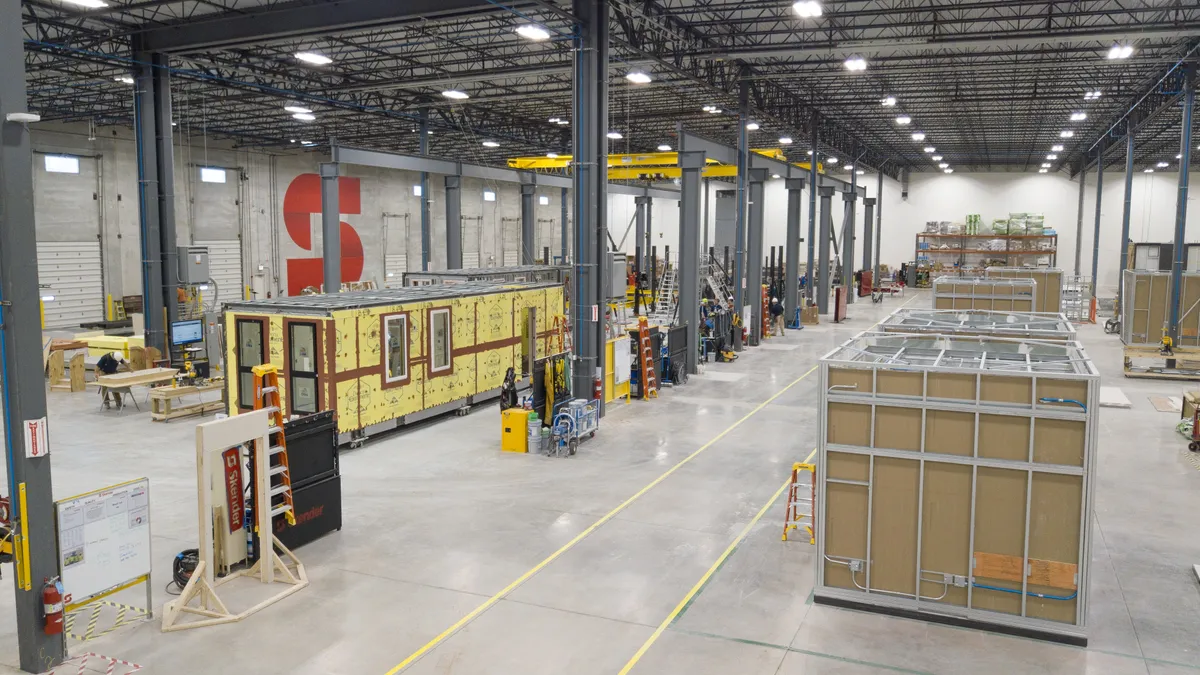Dive Brief:
- Chicago-based Skender Manufacturing, the modular-focused spinoff of general contractor Skender Construction, has announced it is closing its doors due to economic difficulties brought on by the COVID-19 pandemic.
- Skender Manufacturing CEO Mark Skender told Construction Dive that a coronavirus-induced downturn in hotel construction had greatly impacted the firm, which produced modular and prefabricated components for residential and commercial projects. “A big part of our market plan was in hospitality,” Skender said. “Clearly, hospitality is going to take a while to recover, so that put a big dent in our forecast and strategy.”
- The firm spun off in 2020 from Chicago general contractor Skender Construction, which is still in operation. Company officials, who had ambitions to grow the new company to more than 150 employees at the Southwest Chicago factory site, laid off about 25 people last week, according to the Chicago Sun-Times.
Dive Insight:
The demise of Skender Manufacturing, which was heralded as a model for the broader-scale use of modular manufacturing techniques to produce buildings, comes at a time when the larger modular and offsite construction industry has faced its own hurdles due to the pandemic.
While modular’s controlled-factory environment lends itself to better screening and social distancing for workers during the pandemic, several operators told Construction Dive this summer that the expected orders for permanent modular structures, as opposed to emergency-response, temporary facilities, didn’t materialize.
Menlo Park, California-based Katerra, which has envisioned an even more ambitious adoption of modular manufacturing techniques in the construction industry, has announced at least two rounds of layoffs since the beginning of the pandemic.
Modular and offsite manufacturing have long been hailed as the future of the industry, but these types of setbacks illustrate the challenges of bringing modular construction on a large scale to the U.S. building sector.
“It’s a chicken-and-egg problem,” Skender said. “How do you get that scale when there's a lot of uncertainty? It takes the whole ecosystem from the developer, the investor, the construction company and the manufacturer to make a concerted effort to see the big picture.”
And while modular construction accounts for less than 5% of commercial construction activity in the United States, one of the markets it made its biggest inroads into was hospitality, spurred in part by Marriott International’s commitment to build new modular hotels. But this summer, the firm announced it had pulled back on the development of new hotels in the U.S. in the second quarter of this year and scuttled a development meeting to build more hotels, due to the continued uncertainty of the market.
Skender officially stepped into his role as CEO at Skender Manufacturing in June, after earlier succeeding his father and older brother as CEO of Skender Construction. At that time, Justin Brown was appointed as CEO of Skender Construction. Skender Manufacturing, which had been a separate legal entity since its launch in March 2018, according to the firm, then formally spun off in early 2020 as its own company in order to secure financing.
In addition to the hospitality market dealing a heavy blow to his business plan, Skender also said that investor appetite had been curtailed by the pandemic.
“I take responsibility, and I don’t want to make excuses,” Skender said. “But clearly, the pandemic has disrupted business across the board. So now may not be the best time to be raising capital.”
Skender Construction has also felt the impact of the downturn, according to Todd Andrlik, Skender Construction’s vice president of marketing.
“The decade-long bull market, strong demand for construction, and high expectations entering 2020 resulted in most contractors significantly growing in personnel,” Andrlik wrote in an email. “However, the effects of COVID-19 meant that to be responsible stewards of our businesses, firms needed to adjust future projections and, unfortunately, reduce headcount. At Skender, we now expect to close the year with revenues around $400 million, about 3% off 2019.
He said in an email the firm is committed to helping Skender Manufacturing's clients with any projects already in process. "Skender Construction is committed to helping the impacted Skender Manufacturing clients get their jobs done," Andrlik wrote. "Skender executives will provide input as needed to either transition projects to the conventional construction approach, collaborate with third-party manufacturers, or refer clients to other modular manufacturing firms."
He also said the company still believes in the modular model for some jobs. "Modular building has a place in the industry and provides a solution for certain types of projects," Andrlik wrote.
The firm is focusing on more bullish industries, such as life sciences. “In the last few weeks, we’ve won nearly $70 million worth of 2021 construction projects so we’re optimistic a quick recovery is probable," Andrlik added.














